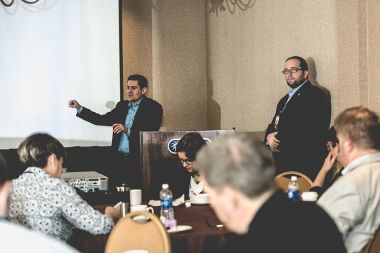Therapy won't turn gay people straight, says prominent Southern Baptist Russell Moore
Efforts to turn gay people straight are "severely counterproductive", according to the president of the Southern Baptist Convention's Ethics and Religious Liberty Commission.

Russell Moore, a senior figure in the denomination and a theological conservative, denounced "reparative therapy" to journalists at the commission's national conference.
"The utopian idea if you come to Christ and if you go through our program, you're going to be immediately set free from attraction or anything you're struggling with, I don't think that's a Christian idea," he said. "Faithfulness to Christ means obedience to Christ. It does not necessarily mean that someone's attractions are going to change."
Moore said evangelicals had an "inadequate view" of what same-sex attraction looks like.
"The Bible doesn't promise us freedom from temptation. The Bible promises us the power of the Spirit to walk through temptation."
Moore drew applause when he condemned anti-gay bullying and called on Christians to address the problem of homelessness for gay and lesbian youth as "a human dignity issue". He said that parents should not shun their gay children.
"You've been given a mission of reconciliation," he said. "Jesus is not afraid to speak the truth, but Jesus is not shocked by people or disgusted by people."
He stressed that Gospel teaching could help people live chastely while being attracted to people of the same gender.
The conference on The Gospel, Homosexuality and the Future of Marriage drew more than 1,000 evangelical pastors and others for three days of seminars and discussions.
Rev Albert Mohler, president of the Southern Baptist Theological Seminary, referred to the number of US states that permit same-sex marriage. "This moral revolution is happening at warp speed," he said. "This is a real challenge to us on biblical authority."
Gay marriage is a "rejection of God's law," Mohler said, adding that evangelicals needed to have "a lot of agonising conversations" about how to move forward. He admitted from the stage that he was wrong in his previous belief that same-sex attraction could be altered through therapy. "One of the embarrassments that I have to bear is that I have written on some of these issues for 30 years," he said. "At a couple of points, I've got to say I got that wrong, and we've got to go back and correct it."
He said in an interview that he expected to see some evangelical churches accepting gay relationships in future. However, he added that they did not belong in the Southern Baptist denomination.
"It's kind of like having a car parked on your foot. If there's a way to get it off our foot, that would be a great thing. If there were a genuine third way, I think we would all want to at least consider it pretty closely. I don't think there is."
Evangelicals who wished to see a broader acceptance of gay Christians in churches also attended the conference and held behind-the-scenes meetings with speakers and delegates. Justin Lee, founder of the Gay Christian Network, said: "My goal here is to meet as many people as I can who disagree with me and talk over coffee."
The Southern Baptist Convention withdrew fellowship last month from the New Heart Community Church in California, whose pastor, Danny Cortez, described it as a "third way" church in which its leaders can hold varying perspectives regarding same-sex marriage. SBC President Ronnie Floyd said that New Heart had "walked away from us as Southern Baptists, we have not walked away from them. So it is with compassion that I would appeal to them to reconsider their decision, mostly their position related to the Word of God on homosexuality."











